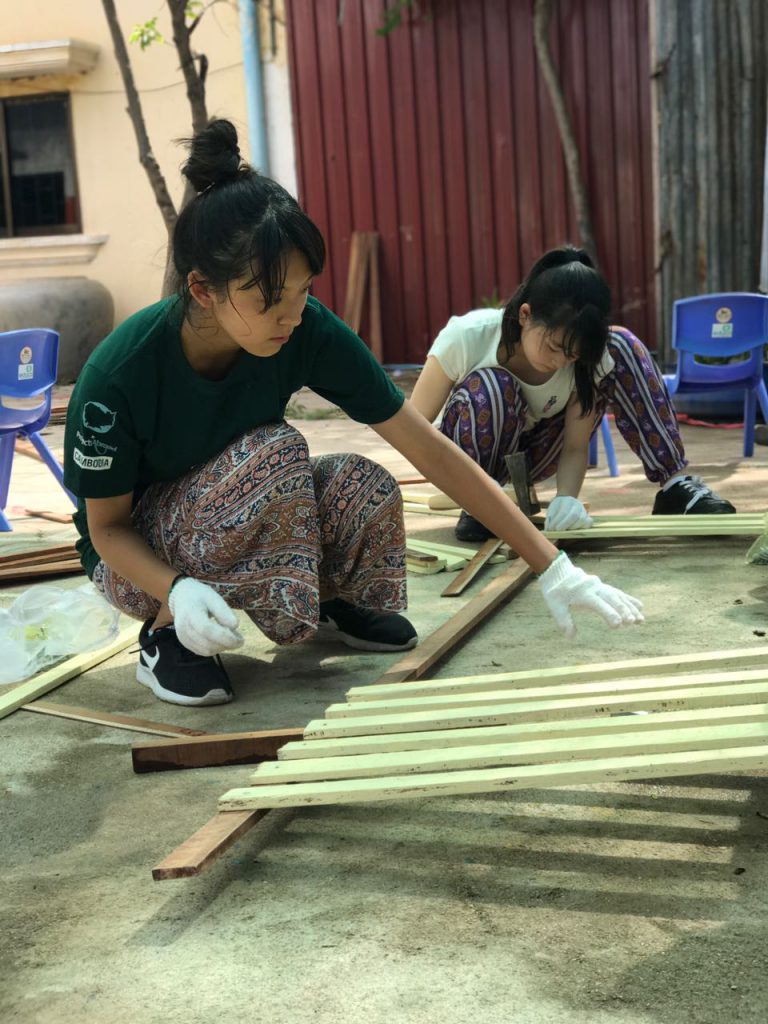Hong Kong gappers intern. Others volunteer and travel.
By Katherine Wang & Lasley Lui
Students always face many tests and exams. Taking a break from academics for a year and having a rest sounds attractive to them.
“Gap year”, originated in Western countries in the 1960s, provides a golden opportunity for students to explore the world, look for a richer spiritual life and exchange cultural ideas. It is usually taken between the end of secondary school and the start of university, or during university education.
What did Hong Kong students do during their gap years?
Oscar Chan Chi-kin, a Year 3 business student at the Hong Kong University of Science and Technology, took a leap in Singapore last year to work as a volunteering national team vice-president for AIESEC, a platform for young people to develop leadership. “Instead of being career-driven like most others, I hope for clarity of life direction, figuring out what I love to contribute to,” he says.

“Leadership does not improve over time at school. Instead, it develops when we are conducting multicultural leading roles,” says Chan. After the gap year, he knew what his ideal working environment looks like in his future career. “Whether the company vision aligns with my personal value is really important.”
Another organisation, Projects Abroad, also provides worldwide volunteering programmes for young people. They can choose among programmes like teaching, conservation and care based on their interests and professions. The most popular destination is Nepal and teenagers like to attend medicine and healthcare projects there.
“Many people came to us because they want to be inspired. If you are not clear about life direction, there is no harm in taking a leap to think about what to do next,” says Vincci Chan Wing-chi, director of Projects Abroad for Hong Kong.
The company says they sent 944 volunteers abroad from the U.S. and 1,263 from the UK last year, while in Hong Kong, only 135 young people joined the programmes.
Instead of travelling and volunteering, young people in Asia especially Hong Kong prefer to intern and work to enrich their resumes, sharpening their competitive edge.
Why do Asian students prefer to intern during gap year?

On the application form for suspension of studies downloaded from the website of the Chinese University of Hong Kong, the reasons for suspension of studies are divided into two categories –– internship and other reasons. In the business school, more than half of the students take gap years for an internship.
Taking a gap year is common among mainland students as well. “Almost all of my colleagues took a gap year,” says Jack Wong, a final year student at CUHK. He had an internship at an investment company in Beijing last semester.
“Internship only exists when you are students. After you graduate, you can no longer apply for an internship, you apply for a job,” he says. He grabbed every opportunity to gain work experiences before he steps into society. A semester-long leave from school seems necessary for him to build an impressive resume. The workplace environment in Hong Kong is too competitive for Jack not to worry about his future employment, motivating him to plan ahead for his career.
“Maybe there is someone going with the flow blindly, taking gap year internship only because others are taking. But there are also people knowing well what they are doing and benefiting from their enjoyable and meaningful experiences.” Wong adds.
Gapyear.com is an online institution selling gap year planning and internship opportunities. The emergence of such kind of institutions might explain why there are criticisms saying that gap year is gradually deviating from its original intention.
“Employers are now looking for relevant workplace skills, knowledge and passion for the vocation to differentiate candidates…The emphasis is now firmly on the ‘super-curricular’ experience – something which a structured gap year offers on a plate!” These appealing words are excerpted from the company’s website.
However, Sascha Choi On, a Korean student from CUHK has a different view. “Nowadays it’s changing. My Asian friends also like to travel during gap year and they really want to find the sense of self such as ‘who I am’, ‘what the goal in my life is.”
“Asian students highly care about their inner peace and happiness rather than just focusing on earning money,” she adds.

Travelling while working
If students want to work while being paid to travel during a gap year, working holiday sounds like a win-win situation.
In 2015, more than 11,000 young people in Hong Kong successfully applied for a working holiday visa, according to the Labour and Welfare Bureau. The Working Holiday Scheme, designed by the government, provides an opportunity for youngsters aged between 18 and 30 to enrich their global exposure in countries like New Zealand, Australia, Ireland, Germany, Japan
Hong Kong youngsters hoping to
The HKFYG has been working with the Hang Seng Bank since 2014 to organise a youth employment programme for low academic achievers in schools. With the guidance of social workers, this group of students are allowed to put their studies on hold for a year to participate in work placements tailored to their interests. Unit-in-charge of Youth Employment Network, Cheung Chi-wai, says a gap year can be a life-changing experience for them.
“A leave from school for a couple of days may not help those students. We hope they can explore their life seriously through a gap year,” Cheung says.
A gap year does not mean one has to leave school. The school will guarantee that students can still return to school after the gap year, which frees them from many worries.
“The ‘Placement’ of our programme does not just mean that students are assigned to job positions. Instead, we put great emphasis on their autonomy and independence. We encourage them to seek full-time jobs by themselves,” Cheung says.
Some attendees failed to find jobs for several times. Cheung says these experiences help them see the reality. “They can have a taste of what a real workplace is like, reflect on it and figure out whether they like to study or work,” says Cheung. “They may compare school life with challenges they experienced in reality. The academic stress for them is just a piece of cake.”
Cheung says for students who have to deal with low motivation to study and emotional problems, exploring and travelling around the world would not solve their problems as they are not mature enough to manage their life. Instead of wasting a whole year, they can obtain a fruitful experience through placement and internships.
“Life-driven gap year is not popular in Hong Kong as open-minded parents are not the mainstream here.” Cheung says.
Tips here for students who want to take a gap year: Always think of why and be brave to pursue what you believe is right.

Edited by Sam Kwong & Valerie Wan







































